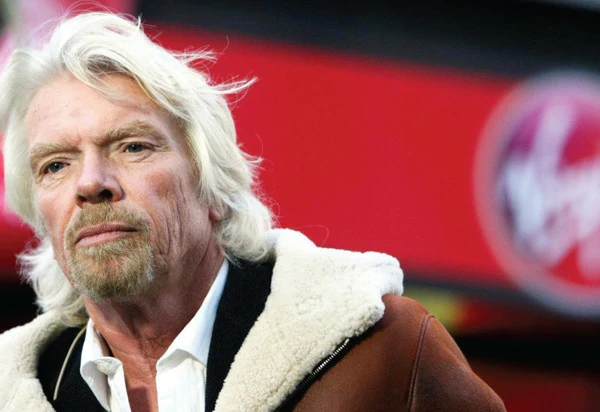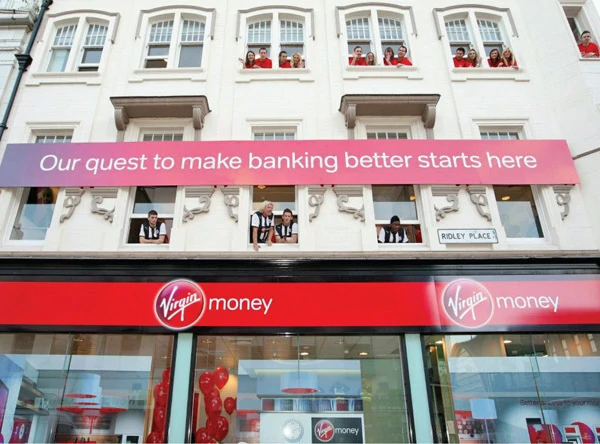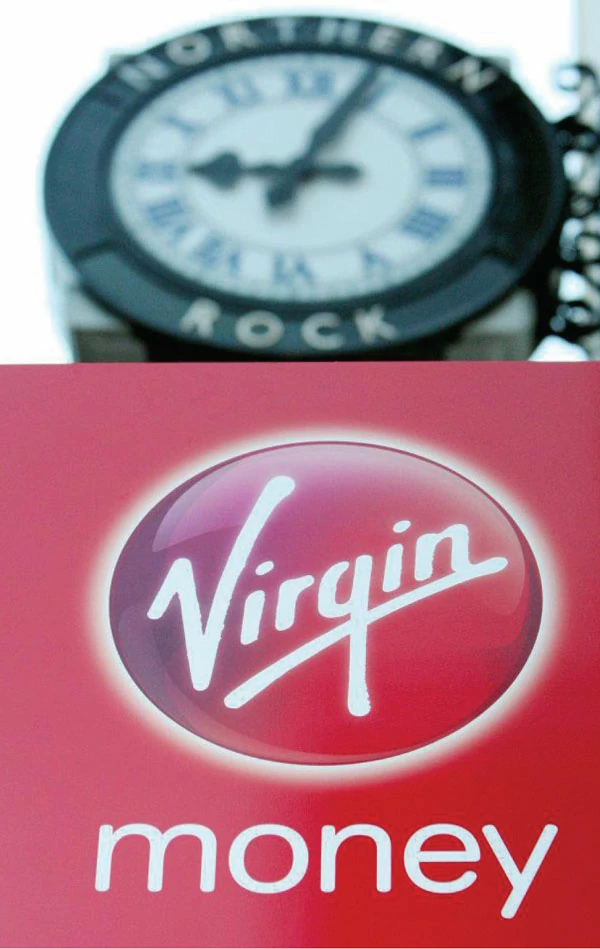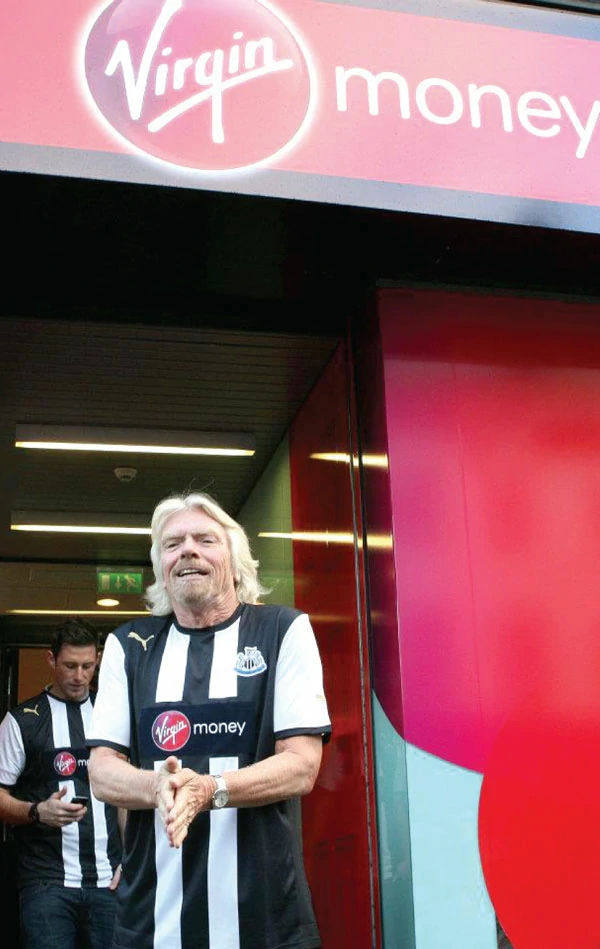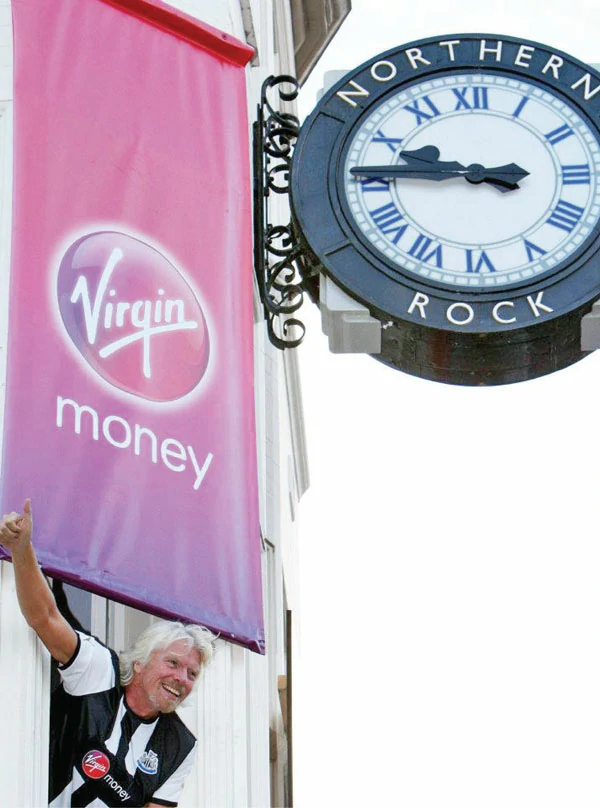
The Business Interview: Margareta Pagano meets the entrepreneur aiming to restore the British public’s flagging trust in banks through Virgin Money’s £747m takeover of Northern Rock
Margareta Pagano / The Independent / The Interview People
The room is bright and white, there are plush red velvet sofas to lounge on and newspapers to read, a grand piano that plays by itself, fresh flowers, free coffee and pastries and spaces to work on your laptop. And then there are the loos, sparkling clean and snazzy, with expensive soap and hand-creams.
At first, it has the feel of a boutique hotel, but then Sir Richard Branson strides into the room with pretty girls in air-hostess style uniforms at his side for a photo-shoot – and you’d be forgiven for thinking it’s an airport lounge. But there are a few tell-tale signs; an ATM machine hidden in the corner and a couple of bowler hats in the window, but otherwise no clues that this is a bank.
We’re in the Virgin Money Lounge on Castle Street in Norwich, and none of this has been staged for Sir Richard’s flying visit. It’s one of two Virgin branches that have been designed to be the banks of the future – all part of his plan to make banking “better again”, and fun too. There’s another Lounge like this in Edinburgh, and others will open this year in Manchester, Newcastle and London, and then in another 10 cities next year.
As well as places to do all the boring banking stuff, these lounges will also be open to rest and work in and for local community groups to hold meetings or exhibitions – this one is already a favourite for four local coppers coming in for coffee every morning. So, safe as well.
The media-to-space tycoon was in Norwich yesterday as part of a whistle-stop tour of his money empire following the £747m takeover of Northern Rock which went through last week; but at times it seemed more like a US-style primary or royal visit as the public, local MPs and dignitaries turned up to listen to him celebrate the takeover, even asking for his signature. In Newcastle earlier in the week even footballers at Newcastle United, where Virgin has taken over sponsorship from Northern Rock, queued for his autograph.
“The Public Is Disillusioned With Their Banks. We Want To Restore That Trust And The Virgin Brand Can Do That.”
It was also a peek of the future, too – as Sir Richard told his audience, after taking over his first train company, the West Coast mainline, he took a sledgehammer to smash the glass window of the ticket office: “Customers need to see and talk to people properly, not through glass.” Now he claims he will do the same for banking; all those horrible glass partitions between the customers and the tellers will go.
Later, on the train back to London, Sir Richard told me how he plans to turn banking on its head: “Bankers have been discredited and they have run their businesses badly. It was their greed that could so easily have caused the greatest crash since 1929 if governments hadn’t stepped in. The public is disillusioned with their banks. We want to restore that trust and the Virgin brand can do that. We’ve done it in other industries – not all have worked – but most have and we will do it again.”
And it’s by being more transparent. “At the moment the big boys offer some products online – but not in the branches and vice versa; this is terrible for older people who maybe don’t want to be online. Any product we offer will be for everyone, and stay the same. Transparent and fair, that’s our aim.”
So far the plan is for the 75 Northern Rock branches to become Virgin ones by the end of the year; and all will have some elements from the Lounge. By 2013, there will be Virgin Money current accounts as well as new products across the spectrum like the successful Virgin One account. Then Sir Richard wants to move into student loans, small business lending and micro-finance for would-be entrepreneurs as well as grow the credit card business.
With Northern Rock, Virgin now has 4 million customers, making it the UK’s seventh biggest bank. “That’s a great platform for us to expand and we aim to double that to 8 million over the next few years and to increase the branches to more than 200.”
“Customers Need To See And Talk To People Properly, Not Through Glass.”
Virgin has between 3 and 4 per cent of the personal banking market but has ambitions to more than double that over the next few years. It’s still flea bite when compared to, say Lloyds, which has 30 per cent of the market, and the big high street five, which have 80 per cent of the market between.
Virgin Money has been growing steadily since the business was first launched in 1995 – a joint venture with Norwich Union in Norwich. Over the last four years profit before tax has grown from £24m in 2007 to £36.4m in 2010 and rose substantially again last year.
With Rock under its belt, Virgin Money is now worth around a billion, taking Sir Richard’s own personal fortune – he owns 48 per cent – to around £3bn. He isn’t a director – not because he didn’t want to take the FSA exams, as some have suggested, or because of his tax status, but because he never takes day-to-day control of any of the Virgin businesses: “I learnt very young that the most important thing in business is to be good at delegation and employ the best executives.”
Instead, he says, what he gives the Virgin brand is his high profile: “What’s good about having me involved personally is that the public can see there is someone who is accountable – so I’m the one who gets all the comments and complaints, which is good feed back for us.” So tweeting is Sir Richard’s secret weapon – he tweets at least three times a day – and has 2.5 million followers.
Now he wants that “fantastic halo” he gets from going into space, or hob-nobbing with people like Nelson Mandela, to show that business can be a force for good, and specifically to reduce unemployment, particularly among the young. “One way is to make it less expensive for companies to introduce to job-sharing or flexi-time. At Virgin we have 60,000 employees in total, and I reckon about 5,000 of them would job-share.”
Giving the young access to micro-finance to start their own businesses is another idea he wants to push. “University students get loans – why shouldn’t those who don’t go to university or college? Many people only want small loans like £500 or £1,000. I started with just £300 – given to me by my mother after she sold a necklace.”
